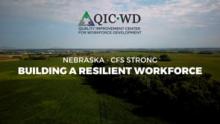Pandemics impact how we work, socialize, and manage our health. Read more in this post and watch an excerpt from our webinar.
Watch the VideoOptimism, or positive thinking, can be learned and is important to building resilience. By developing a practice of reframing and controlling self-defeating statements automatic negative thoughts can be replaced with positive ones. By focusing on the positive, individuals are more apt to remain hopeful, resilient, and focus their energy on things they are able to control.
Watch the VideoThe Nebraska Department of Health and Human Services’ Children and Family Services (CFS) partnered with the QIC-WD to strengthen its child welfare workforce. The team created CFS Strong to address secondary traumatic stress (STS). This video features CFS staff discussing how STS impacts their job and how CFS Strong is designed to address it. The QIC-WD is studying this intervention and will report on evaluation results in the future.
Watch the Video

